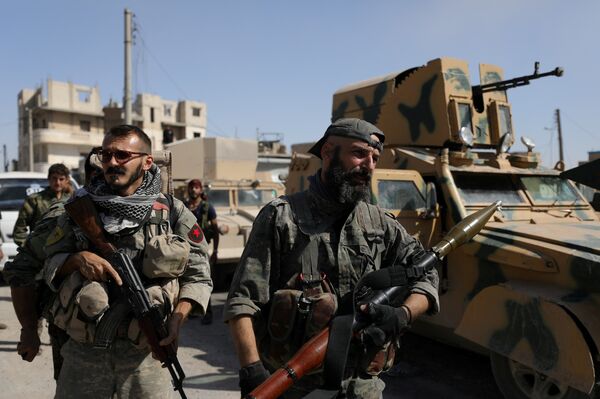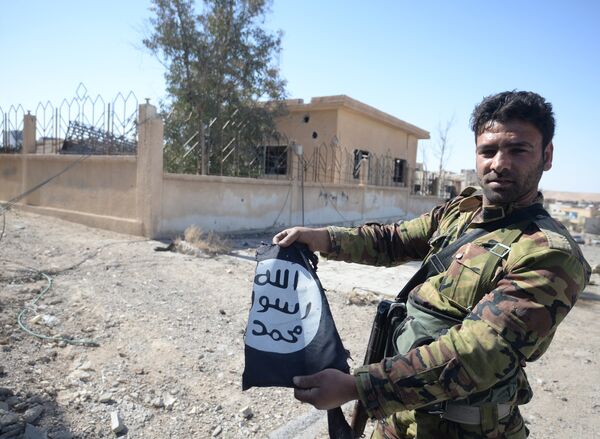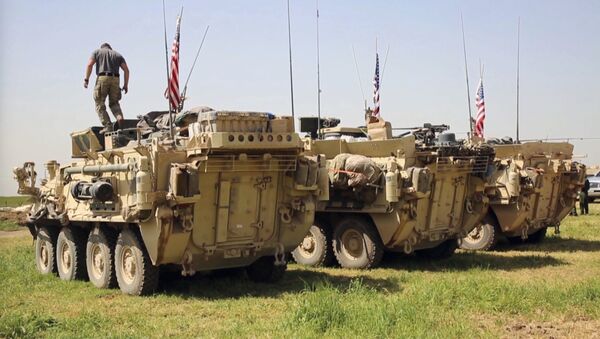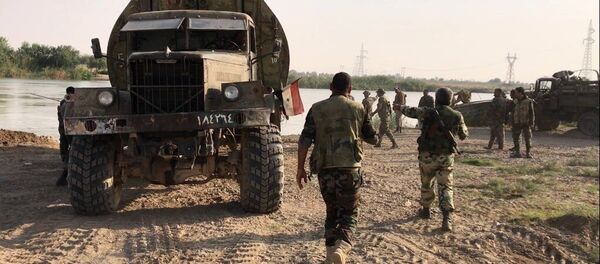The US defense department has claimed that US forces, not Russian and Syrian forces, are responsible for retaking the lion's share of Syrian territory from Daesh terrorists.
"Most of the territory liberated in Iraq and Syria has been liberated through the efforts of the Global Coalition and its partners," Pentagon spokesman Eric Pahon told Sputnik.
Peter Ford, a former UK ambassador to Bahrain and Syria, told Radio Sputnik that the claim is an attempt to justify the US' continuing presence in Syria, against the wishes of the Syrian government.
Sputnik: Reports are suggesting that the US is claiming massive success in the fight against Daesh, in comparison with Russia, in Syria. Do you think that's the case?
Sputnik: So why do you think they're making these claims now?
Peter Ford: I think it's sour grapes, because Russia has virtually delivered the mortal blows to Daesh, the Americans can't get used to the idea that Russia has played the major role and the Americans are uncomfortable with the idea that all their plans for Syria and regime change have come to naught. It's sour grapes.
Sputnik: US forces say that they're going to stay in Syria indefinitely. Pentagon spokesman Eric Pahon has recently said the US intends to "support our partners and prevent the return of terrorist groups." What partners does the US have in a country that never wanted its presence there?
Peter Ford: The Americans are making it up, of course. There's no legal justification whatsoever for their presence, and the idea that they're hanging around to make sure that Daesh doesn't come back, is a transparent, flimsy excuse. As we know, the Americans have been helping the Kurdish Peshmerga and a thin veneer of Arab tribal militias, but the Kurds don't need help from the Americans to deal with Daesh now.
Daesh is finished as a fighting, military force, although they're still capable of terrorist actions as we saw yesterday in Homs. But the Americans are just using this as a flimsy pretext to keep a presence, which they hoped will be destabilizing to Syria, which would help to make the de facto partition of Syria, between the Kurdish areas and the rest of the country, more concrete.
But it won't work, if the Americans do keep boots on the ground they're going to take casualties, there will be attacks on those soldiers, there will be body bags, but most importantly of all, there is no way that the Iranian forces and their allies, such as Hezbollah, are going to leave Syria while there is one pair of American boots on the ground.

Peter Ford: America has the capability of a spoiler, but it has no constructive capability at all, in the present circumstances. American policy at the moment is, quite simply, just to complicate the peace-building. They have been marginalized in the negotiations in Geneva and in Sochi, and they are simply playing the role of spoiler.
Sputnik: Iraq is perhaps a good example of how a post-war country can crumble after US military intervention, particularly without financial support. Do you think that the US will have the money to spare to rebuild Syria?
Peter Ford: All that is really required for the US to be constructive is not their money, but for them to stop making things more difficult for the reconstruction. They are doing that at the moment by maintaining sanctions which paralyzed an enormous amount of economic activity, because Syria is effectively excluded from the international banking system.
Sputnik: So do you think that this support that they're talking about will be limited to military presence, and possibly even zero humanitarian aid?
Peter Ford: America will no doubt try to fly in some fairly negligible amount of humanitarian aid into the Kurdish areas to justify their continuing presence, but it is only a matter of time before the Americans do have to leave because as I've just mentioned, there's no way the Americans are going to get the Iranians out.
Apparently this is a major Trumpian objective, he wants to be able to say that he recovered Raqqa and he got the Iranians out of Syria. Well, the Syrian government will not ask the Iranians to leave while there is one pair of American boots on the ground, or while sanctions are still in place.

Peter Ford: Right is might, that's the American watchword. America's contempt for international law is well known, we're just seeing another example today with the recognition of Jerusalem as Israel's capital. This flies in the face of international legality.
Sputnik: Do you think Trump understands the complexity of the situation?
Peter Ford: Previous American presidents have basically pursued the same policy. Contempt for international legality is not new with Trump's mandate. It's been a hallmark of American politics for many, many years.
Sputnik: Do you think it will change?
Peter Ford: No, a leopard doesn't change its spots. But in the case of Syria, they will find they have been indulging in wishful thinking if they really believe that they are going to keep troops on the ground in Syria without paying a heavy cost.



